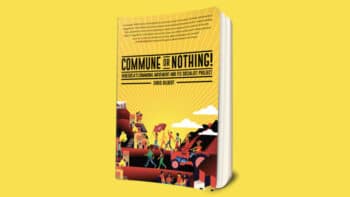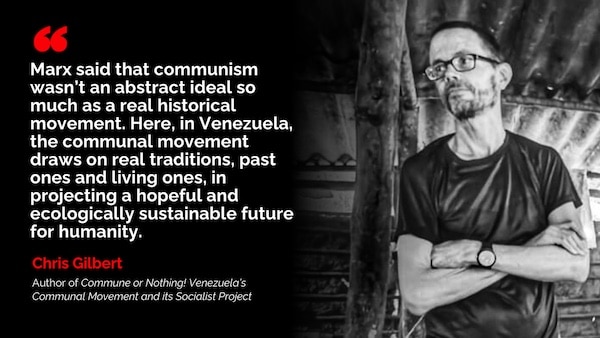Chris Gilbert is a Marxist scholar committed to the revolutionary process in Venezuela, who teaches at the Bolivarian University in Caracas. His new book, Commune or Nothing! Venezuela’s Communal Movement and Its Socialist Project, just released by Monthly Review Press, is an engaging account of the country’s old-yet-new experiment in building a free, diverse, and humanly-rich society that is not bound by capitalist exchange-value production.
Cira Pascual Marquina: What inspired you to write the book Commune or Nothing?
Chris Gilbert: I’ve been living in Venezuela and participating in the Bolivarian Revolution for 18 years. However, this book has a very precise origin. Some three years ago, I visited El Maizal Commune in Lara State and spent a little over a week there. It was an extremely difficult time, with fuel, food, and medicine shortages everywhere in this cruelly-sanctioned country.
What I saw and experienced during those days at El Maizal was frankly awe-inspiring! I felt a huge sense of marvel and respect for what people there were doing, what they were building, and their ways of going about it. I began to write as a way to capture that experience, as a way of recording and rendering homage to something that I thought was extremely important for people everywhere to know about and understand.
That initial experience led to more visits to El Maizal and to other communes, more writing, and finally the book.

The cover of Chris Gilbert’s new book was a collaboration with the Venezuelan collective Utopix.cc. (Monthly Review Press)
CPM: How is the book structured? What is its method?
CG: Technically, the book combines theoretical and historical chapters with chronicles of visits to different communes. It is about half of one and half of the other. There is an introduction that offers a theory of the socialist commune; a chapter devoted to Hugo Chávez and Istvan Mészáros’s thinking in relation to the communal system; another that looks at the Venezuelan project’s connection with Indigenous and Maroon communal construction over the longuedurée; and five chapters focused on specific communes or communal experiments.
Overall, my main idea was to combine theory and observation. I worked to put them in dialogue with each other, following a certain materialist tradition that you find in Marx and Engels, in works such as The Condition of the Working Class in England or The Eighteenth Brumaire of Louis Bonaparte. That said, I also tried to make the book readable: a book that someone would want to begin to read and go on reading.
CPM: What would you say is the most important contribution of Commune or Nothing!?
CG: That’s a hard question to answer, because I’m so close to the book. Nevertheless, I think that, in a modest way, the book offers a theory of the commune as a building block for socialism, and as a strategic focus during the socialist transition. Mind you, the commune should be a strategic focus but not an exclusive one, since there must simultaneously be an attempt to extend the new social metabolism, as expressed in the communal system, to the whole society and an effort to overcome the state form.
Like any Marxist contribution, this theory of the socialist commune centers on the importance of value as a structuring logic of capitalist societies. The book argues that democratically organized communes, of the kind being built in Venezuela today, allow us to overcome the straitjacket of exchange-value production, enabling thereby the abolition of not just economic exploitation and alienation, but also the whole range of oppressions (gender, sexual, racial, political, colonial, and so on) that exist in our society and the rampant expropriation of nature.
The commune is a comprehensive reworking of social relations that potentially responds to the multiplicity of oppressions in our society.
CPM: Can you delve in further to give readers a sense of your argument?
CG: In a socialist commune people produce use-values to satisfy needs. They do so directly, guided by the community’s democratic decision-making processes. This means they are not producing just to get paid, and that their products and services aren’t simply thrown into the market—as is typical of much of the work in a capitalist society, where huge quantities of products are socialized indirectly through market exchanges. In a commune, democratically controlled work becomes both non-exploited and non-alienated. Moreover, since the communards’ work is now directed to rational, real, and therefore limited needs, it can also end the rampant expropriation of nature that is endemic to capitalism.
But ending exploitative, alienated wage labor is only half the story of the transformations brought about by socialist communes. As everyone should know by now, there is a great deal of unpaid work done in our societies, specifically care work and domestic labor. This is the work of reproduction, or social reproductive labor. Capitalism undervalues this work but also needs it, since without it workers can’t return to work the next day and there is no generational replacement. Most often this work is carried out by women and racialized people in oppressive conditions and with a great deal of coercion. In a commune, once exchange-value-producing or “productive” work is taken off its pedestal and all work is under democratic community control, this social reproductive labor will be equally valued and shared among members of the community. It won’t be carried out any longer in what Nancy Fraser calls the “hidden abodes” of reproductive labor, meaning that one of the key bases of gender and racial oppression, can also be ended.
There is a huge promise being opened up here in the communal movement in Venezuela. In a commune, overcoming the grim reign of capital is all about expanding human horizons and giving space to all-round human development. When freed from the straitjacket of capitalist value-production—which reduces some people to just “time’s carcasses,” as Marx said, and enslaves others in dreary labor-intensive domestic work, while shoving huge masses of people into “surplus populations”—new, richer, more diverse forms of life can emerge. In the commune, people’s today largely untapped creative potential can be unleashed, and the full range of human expression, including gender expression and sexual diversity, can flourish. Importantly, too, without the capitalist drive to accumulate, the expropriative approach to nature can come to an end.
CPM: For whom is your book written? Who are the intended readers?
CG: I would like to say anyone and everyone! I think the book can give people who know nothing about Venezuela’s communal project a meaningful introduction, but it can also contribute to the understanding and debates of those already engaged with the project in some way or other.
One thing I would like to point out is that the communal project in Venezuela has worldwide importance. In a preface, Marx imagined his German readers of Capital thinking that his book, which focused on English capitalism, had nothing to do with them. Marx said to those readers, not so, de te fabula narratur [it’s a story about you]. His idea was the logic and laws of capitalism applied to their context too. I would like to say the same thing about what is described and theorized in my book. The communes in Venezuela, whether a rural commune such as El Maizal or an urban one like El Panal, represent a socialist option that is relevant, mutatis mutandis[changing what needs to changed], to people everywhere who are interested in building a better world.
CPM: Is the communal project a radical project? Is it a revolutionary one?
CG: Very much so! I always say that Venezuela’s communal project is radical in at least two fundamental senses. Firstly, it’s radical in the sense that it goes to the root of the multi-crisis that we are living through now and proposes to change the essential logic of our society, which I call the capitalist social metabolism, putting it on a new communal basis that also involves overcoming both the whole capitalist economy and its state forms.
Yet the project is also radical in the sense that it connects with the deep roots of longstanding projects of emancipation: both the longstanding project of the working class (as expressed, for example, in the Paris Commune) and practices of Indigenous and Maroon resistance and self-governance in Latin America. Remember that Marx said that communism wasn’t an abstract ideal so much as a real historical movement. Here, in Venezuela, the communal movement draws on those real traditions, past ones and living ones, in projecting a hopeful and ecologically sustainable future for humanity.

